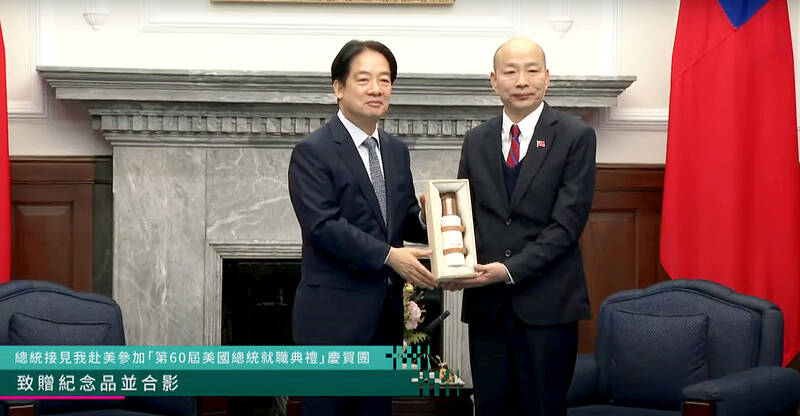President William Lai (賴清德) yesterday stressed unity despite domestic political differences as he received the delegation that is to attend the inauguration of US president-elect Donald Trump at the Presidential Office in Taipei.
A cross-party delegation led by Legislative Speaker Han Kuo-yu (韓國瑜) is to depart for Washington tomorrow to attend the US presidential inauguration on Monday.
In a speech at the Presidential Office, Lai said that the delegation projects unity to the outside world, which would work to the nation’s benefit by deepening Taiwan-US relations.

Photo: screen grab from the Presidential Office livestream
He thanked Han of the opposition Chinese Nationalist Party (KMT) for stepping forward to lead the delegation and commended the lawmakers from different parties for coming together to represent the nation.
With the goal of promoting peace and prosperity, the delegation would stand together as one nation, the Republic of China (Taiwan), Lai said.
It would show Taiwan’s commitment to democracy, even under the threat of authoritarianism, and its resolve to stand with the US and the democratic world, he said.
Taiwan-US relations continue to grow, as shown by recent bilateral agreements, such as the double taxation legislation that was passed by the US House of Representatives on Wednesday, he added.
Han said that the delegation represents Taiwan’s voice as a democratic nation.
Democracy has become a part of the DNA of Taiwan’s 23 million people, a result of generations of hard work by their predecessors, he said.
Han compared Taiwan’s security to a table resting on four legs: protecting the Republic of China, freedom and democracy, maintaining relations with the US and cross-strait stability.
The delegation also includes Democratic Progressive Party legislators Wang Ting-yu (王定宇), Chen Kuan-ting (陳冠廷) and Jean Kuo (郭昱晴); KMT legislators Ko Chih-en (柯志恩), Lee Yen-hsiu (李彥秀) and Ko Ju-chun (葛如鈞); and Taiwan People’s Party Legislator Chen Gau-tzu (陳昭姿).
Aside from attending the inauguration, the delegation is to meet with US officials, academics and representatives of the Taiwanese-American community before returning to Taiwan on Thursday next week.

WAITING GAME: The US has so far only offered a ‘best rate tariff,’ which officials assume is about 15 percent, the same as Japan, a person familiar with the matter said Taiwan and the US have completed “technical consultations” regarding tariffs and a finalized rate is expected to be released soon, Executive Yuan spokeswoman Michelle Lee (李慧芝) told a news conference yesterday, as a 90-day pause on US President Donald Trump’s “reciprocal” tariffs is set to expire today. The two countries have reached a “certain degree of consensus” on issues such as tariffs, nontariff trade barriers, trade facilitation, supply chain resilience and economic security, Lee said. They also discussed opportunities for cooperation, investment and procurement, she said. A joint statement is still being negotiated and would be released once the US government has made

NEW GEAR: On top of the new Tien Kung IV air defense missiles, the military is expected to place orders for a new combat vehicle next year for delivery in 2028 Mass production of Tien Kung IV (Sky Bow IV) missiles is expected to start next year, with plans to order 122 pods, the Ministry of National Defense’s (MND) latest list of regulated military material showed. The document said that the armed forces would obtain 46 pods of the air defense missiles next year and 76 pods the year after that. The Tien Kung IV is designed to intercept cruise missiles and ballistic missiles to an altitude of 70km, compared with the 60km maximum altitude achieved by the Missile Segment Enhancement variant of PAC-3 systems. A defense source said yesterday that the number of

‘CRUDE’: The potential countermeasure is in response to South Africa renaming Taiwan’s representative offices and the insistence that it move out of Pretoria Taiwan is considering banning exports of semiconductors to South Africa after the latter unilaterally downgraded and changed the names of Taiwan’s two representative offices, the Ministry of Foreign Affairs (MOFA) said yesterday. On Monday last week, the South African Department of International Relations and Cooperation unilaterally released a statement saying that, as of April 1, the Taipei Liaison Offices in Pretoria and Cape Town had been renamed the “Taipei Commercial Office in Johannesburg” and the “Taipei Commercial Office in Cape Town.” Citing UN General Assembly Resolution 2758, it said that South Africa “recognizes the People’s Republic of China (PRC) as the sole

Taiwanese exports to the US are to be subject to a 20 percent tariff starting on Thursday next week, according to an executive order signed by US President Donald Trump yesterday. The 20 percent levy was the same as the tariffs imposed on Vietnam, Sri Lanka and Bangladesh by Trump. It was higher than the tariffs imposed on Japan, South Korea and the EU (15 percent), as well as those on the Philippines (19 percent). A Taiwan official with knowledge of the matter said it is a "phased" tariff rate, and negotiations would continue. "Once negotiations conclude, Taiwan will obtain a better